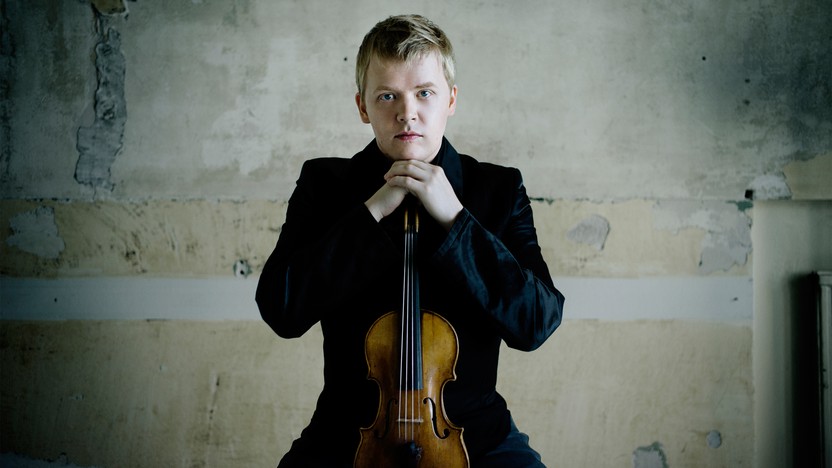Details

Pauline Oliveros
13 Changes
Pauline Oliveros dedicated her life to a practice she called “deep listening,” promoting physical and psychological transformation through acute awareness of sound. Building on her pioneering early career in California’s Bay Area, where she co-founded and directed the San Francisco Tape Music Center, Oliveros developed group exercises and performance instructions that drew from her experiences with tai chi, body work, feminist and LGBT activism, musical improvisation and meditation, among other influences. Until her death in 2016, she advanced her work through the Deep Listening Institute. She was also a captivating performer who improvised on the accordion in her own Deep Listening Band.
13 Changes, composed in 1986 for the violinist-improviser Malcolm Goldstein, does not dictate any specific musical material, length, or instrumentation. Oliveros simply prompts the performer(s) with brief, intriguing snippets of text to guide the improvisation. (The first instruction is: “Standing naked in the moonlight—Music washing the body.”) To do justice to Oliveros’ approach requires deep presence and connection within the ensemble, which in turn invites the audience to join in that state of expanded consciousness.
Aaron Grad ©2018
Missy Mazzoli
Vespers for Violin
Vespers for Violin, for amplified violin and electronics, began as a reimagining of my recent composition Vespers for a New Dark Age. I sampled keyboards, vintage organs, voices and strings from that composition, drenched them in delay and distortion, and re-worked them into a piece that can be performed by a soloist. The result is something completely separate from the original work, with only distant, nostalgic connections to the source material. Vespers for Violin was composed for Monica Germino and Frank van der Weij, and later recorded by violinist Olivia De Prato for her recent album Streya.
Missy Mazzoli ©2018
Missy Mazzoli
You Know Me From Here
You Know Me From Here was commissioned by Carol Cole, for the Kronos Quartet, in honor of her husband Tim's 75th birthday. When she asked me to write this piece I immediately imagined a 20-minute musical journey homeward, a trek through chaos (I. Lift Your Fists) and loneliness (II. Everything That Rises Must Converge) to a place of security and companionship (III. You Know Me From Here). This is, at its core, music about loss, but in the most positive sense; it speaks of the loss of our old selves, the jumps into the unknown, the leaps of faith we all must make and the beautiful moments when we find solace in a person, in an idea or in music itself. The music shifts constantly from earthy, gritty gestures to soaring, leaping melodies that rarely land where we expect.
Missy Mazzoli ©2018
Steve Reich
Duet for Two Violins and Strings
In the 1960s, Steve Reich broke away from musical academia and its obsession with complex, European techniques. He supported himself by driving a taxi in San Francisco, and he began to connect with other West Coast mavericks who were experimenting with trance-like loops and repetitive cycles, giving rise to the movement that has come to be called “Minimalism.” After moving to New York, he established his own ensemble, Steve Reich and Musicians, which provided a DIY outlet for his pulsing, multi-layered scores. He also found new ways to utilize recording technology, combining live and pre-recorded layers of the same instrument in such works as Vermont Counterpoint (1982) for flute and Electric Counterpoint (1987) for guitar.
With its smooth pulses and precise canons (in which one voice follows another), the Duet for Two Violins and Strings achieves a depth of texture and sonic fascination that has always been a hallmark of Reich’s output, regardless of the medium. He dedicated the score “to Yehudi Menuhin and to those ideals of international understanding which Sir Yehudi has practiced throughout his life.”
Aaron Grad ©2018
 Listen to Audio
Listen to Audio
John Adams
Shaker Loops
Shaker Loops, born out of the large-scale Minimalism developed by Steve Reich and Philip Glass in the 1970s, was a breakthrough work for the young John Adams. In its initial form, it was a string quartet titled Wavemaker; as Adams explained in a program note, “I gradually developed a scheme for composing that was partly indebted to the repetitive procedures of Minimalism and partly an outgrowth of my interest in waveforms.” Unsatisfied with his first attempt, expanded the score into a string septet (and ultimately string orchestra) and changed the title to Shaker Loops.
“The ‘loops’ idea”, he wrote, “was a technique from the era of tape music where small lengths of prerecorded tape attached end to end could repeat melodic or rhythmic figures ad infinitum. (Steve Reich’s It’s Gonna Rain is the paradigm of this technique.) The Shakers got into the act partly as a pun on the musical term ‘to shake,’ meaning either to make a tremolo with the bow across the string or else to trill rapidly from one note to another.
“The flip side of the pun was suggested by my own childhood memories of growing up not far from a defunct Shaker colony near Canterbury, New Hampshire. Although, as has since been pointed out to me, the term ‘Shaker’ itself is derogatory, it nevertheless summons up the vision of these otherwise pious and industrious souls caught up in the ecstatic frenzy of a dance that culminated in an epiphany of physical and spiritual transcendence. This dynamic, almost electrically charged element, so out of place in the orderly mechanistic universe of Minimalism, gave the music its raison d’être and ultimately led to the full realization of the piece.”
Aaron Grad ©2018
About This Program
Artistic Partner Pekka Kuusisto leads an all American program for these Thanksgiving weekend concerts, including works by the phenomenally talented Missy Mazzoli. Kuusisto and the SPCO will premiere a new version for full string orchestra of her string quartet, You Know Me From Here, written for the Kronos Quartet. As described by Mazzoli, the work is a “musical journey homeward, a trek through chaos and loneliness to a place of security and companionship.” Also on the program are John Adams’ Shaker Loops, an ecstatic tour de force for the SPCO strings, Reich’s charming Duet for Two Violins, and an improvisatory piece for variable instrumentation based on quirky fragments of text by the pioneering composer and improviser Pauline Oliveros.
Contribute
SPCO concerts are made possible by audience contributions.
Newsletter
For exclusive discounts, behind-the-scenes info, and more:
Sign up for our email club!

